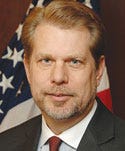Device Industry Unfamiliar with CMS Chief Nominee
July 1, 2007
NEWS TRENDS
|
CMS nominee Weems has been a leader in the adoption of health IT. |
Despite the fact that Kerry Weems, President Bush's nominee to head CMS, has two decades of experience at HHS, little is known about him in device circles. However, with only two years left in the current administration, it's not expected that Weems would implement any drastic changes at the agency. At press time, the Senate had not confirmed the nomination.
It's no secret that Weems is versed in budget issues. He's currently the deputy chief of staff to HHS secretary Michael Leavitt. His past experience includes serving as CFO and acting assistant secretary for budget, technology, and finance. He has also been the deputy assistant secretary for budget at HHS.
Less is known about his association with the device industry and how well he will fare in dealing with CMS matters related to medical devices.
“I can't project whether it's good or bad for the device industry. I would say it suggests that he would not be a political choice,” says Ted Mannen, reimbursement expert and an attorney at law firm Epstein, Becker & Green PC (Washington, DC). “Context is everything in a situation like this. We're in the last couple of years of the administration, and I think it's probably not a time of bold initiative in Medicare.”
Although the next two years might not be a time for bold policies, the next CMS administrator will still face a couple of tides on the device side. First is the inpatient prospective patient system (IPPS), which underwent significant revisions last year and was surrounded by a whirlwind of controversy. In April, CMS released the IPPS proposed rule for FY 2008. The document moves forward with implementing changes, such as transitioning from charge-based weights to cost-based weights. Another change involves adjusting payments to hospitals based on the severity of a patient's illness. Such adjustments added more diagnosis-related groups. The goal is to avoid underpayments for treating severely ill patients. The new CMS head will need to make sure that the transitions are made smoothly.
Less-predictable policies include the guidance document on coverage with evidence development, which has been out for about a year, and a proposal for a new Medicare clinical research policy (currently known as the Medicare National Clinical Trial Policy). “Both of those are unknown as far as how they'll be implemented over these next couple of years,” says Mannen. He adds that industry could expect the new clinical research policy within months.
With regard to Weems's qualifications, Leavitt seems to think he's appropriate for the job. “He understands the fiscal challenges facing Medicare and Medicaid and what it will take to strengthen and sustain those programs for the future,” he noted in a statement released by HHS. “He has been a leader in this department's efforts to accelerate adoption of health information technology and better financial management systems, which will be a valuable asset to CMS.”
Stephen Ubl, president and CEO of AdvaMed, also cites Weems's “outstanding work” at HHS, along with his “well-regarded tenure overseeing the agency's budget and technology issues.”
Jori Frahler, director of federal affairs at the Medical Device Manufacturers Association (MDMA), agrees that Weems's budget experience could prove beneficial in the position but suggests that it could also lead to reimbursement limits. “I think he will do a good job of trying to keep CMS solvent; however, this will probably mean tighter constraints on reimbursement. This will be problematic for the device industry because new technology is more expensive. We don't want to see a reduction in innovation because reimbursement looks bleak.”
“Everything I have seen as far as public statements and heard informally [about Weems] has been very positive,” says Mannen. “From the characterizations I've heard, he's very professional and knowledgeable. If it leads to good solid decisions on the basis of merit, that's all you can hope for.”
Bush also nominated Tevi Troy as deputy secretary at the agency. Troy would be replacing Alex Azar, who left the post in February. Troy is currently the deputy assistant to the president for domestic policy.
Copyright ©2007 Medical Device & Diagnostic Industry
About the Author(s)
You May Also Like


.png?width=300&auto=webp&quality=80&disable=upscale)
